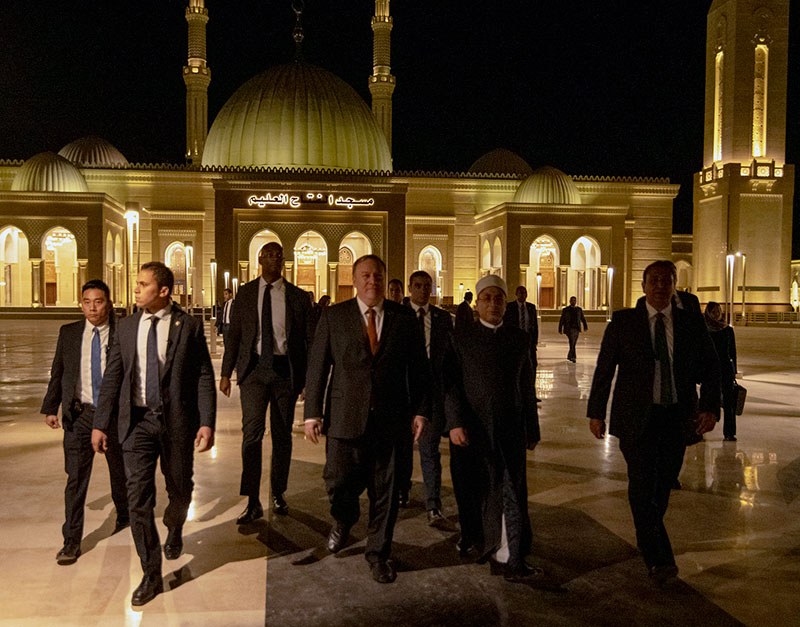
U.S. Secretary of State Michael R. Pompeo visits Al Fattah Al Alim Mosque in Cairo, Egypt, on January 10, 2019.
On January 10, 2019, U.S. Secretary of State Mike Pompeo, who was visiting eight countries in the Middle East, arrived in Egypt and delivered a major speech on U.S. foreign policy in the Middle East in of Cairo, expounding the Trump administration’s new thinking on the Middle East. In fact, during Pompeo’s eight-nation Middle East tour, U.S. National Security Advisor John Bolton visited Israel and Turkey to contain the fallout from President Donald Trump’s Syria withdrawal announcement on December 19, 2018, which sent shockwaves across the region, and to appease U.S. regional allies, showing them that the United States has not left the Middle East. Trump’s so-called new thinking on the Middle East is a tactical retreat, but the United States remains strategically committed to the region.
Tactical retreat: U.S. troops withdraw from Syria
The announcement of Trump’s Syria withdrawal on December 19, 2018, was sudden. Many people seem to think that the United States wants to get out of the Middle East and has no intention of resolving the mess in the region and wants to hand U.S. interests at stake in Syria over to Russia and Iran as well as to the Syrian government. But in fact, it was consistent with Trump’s philosophy of putting America’s interests first and never getting bogged down in bad deals. It was an attempt to get rid of the financial and military burdens that the garrison in Syria has brought to the United States, and to share U.S. financial and military investments through the formation of the Middle East Strategic Alliance (MESA), or “Arab NATO,” consisting of Saudi Arabia, Egypt, and other Middle East countries. However, washing one’s hands of something is not the same as flinging off vested interests. The move does not change the fact that the United States still has a strategic presence in the Middle East and the country still plays a leading role in the region.
The decision to withdraw from Syria was a tactical one. That is why when the decision was announced, it immediately triggered shockwaves. For example, after Turkish soldiers drove out Syrian Kurdish forces, forcing the latter to depend on the Syrian government and Russia for their defense, Syrian government forces quickly moved into the area and seized control of Manbij. This forced Trump and his team to adjust their policy, and the timetable for withdrawal also naturally changed, going from immediately to as soon as possible, and then to a slow four-month timeline for withdrawal, to no timeline at all. Trump, after all, was thinking in binary terms and rushed to commence the withdrawal process before Christmas to win the applause of American soldiers and their families, only to be forced to deal with the resignation of his former defense secretary, James Mattis, along with turmoil in the Middle East and unhappy regional allies. Thus, he quickly made changes and sent high-ranking officials to the Middle East to extinguish the fire, and Pompeo explained Trump’s new thinking on the Middle East in Egypt to clarify America’s strategic commitment.
Strategic commitment: Create an Arab version of NATO
Pompeo visited eight Middle Eastern countries on his trip: Jordan, Egypt, Bahrain, the United Arab Emirates, Qatar, Saudi Arabia, Oman, and Kuwait, and before his visit to Egypt, he visited Iraq, following Trump’s Christmas surprise visit, which was not one of the eight countries on the list. The purpose of the visits was mainly to appease U.S. allies in the Middle East, indicating that the United States remains committed to the region and will continue working with them in the fight against the Islamic State and other terrorist forces. More importantly, the visits were meant to unite the Middle East allies. The United States aims to contain Iran through the formation of MESA (i.e. “Arab NATO”) and wants to ultimately pass on the responsibility of the Middle East situation to MESA, which would complete the U.S. withdrawal from Syria and ensure America’s unassailable strategic dominance in the Middle East.
Therefore, Trump’s new thinking on the Middle East must emphasize that Iran is evil and a threat to regional security, so that MESA has a common security objective and enemy. In his speech in Egypt, Pompeo explicitly accused Iran of being the single greatest threat to security and development in the Middle East. He said that if Iran persists on its current course, nations in the Middle East will never enjoy security, achieve economic stability, or advance the dreams of their people. He also said that the United States will continue to toughen sanctions against Iran and prevent it from adversely affecting the region and the world. Although the United States left the Iran nuclear deal in May 2018 and imposed sanctions on Iran in various fields such as energy, finance, shipping, and shipbuilding, the United States knows that it cannot rely solely on its power to contain and coerce Iran, so it needs to form a circle of its friends around Iran in the Middle East to squeeze the nation. Therefore, in his speech, Pompeo called on all nations to join U.S. efforts and apply unprecedented pressure on Iran.
In addition, Pompeo chose to deliver his speech on Trump’s new thinking on the Middle East in Egypt, with the intention of drawing closer to and tightening relations with Egypt, in addition to Israel and Saudi Arabia, the original two U.S. regional partners. The two countries want to establish a 2+2 strategic dialogue mechanism based on the previous US-Egypt strategic dialogue, which will be a strategic dialogue between the defense and foreign ministers of the two countries. By strengthening all-round cooperation in the political, economic, military, and development fields with Egypt, the United States has been able to weaken the bond between Egypt and Russia in recent years, and through Israel, Saudi Arabia, and Egypt, it will attempt to implement its Middle East strategy.
